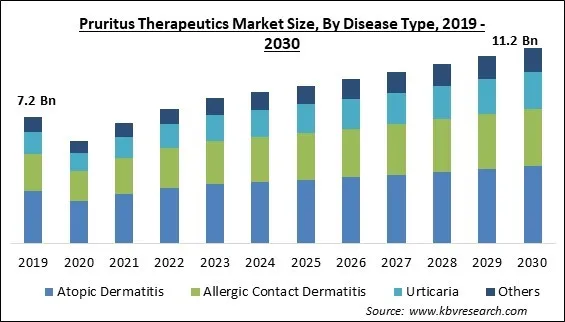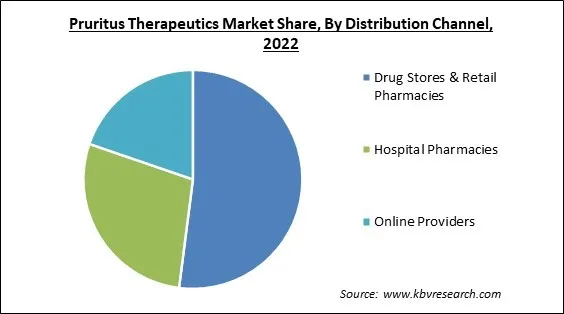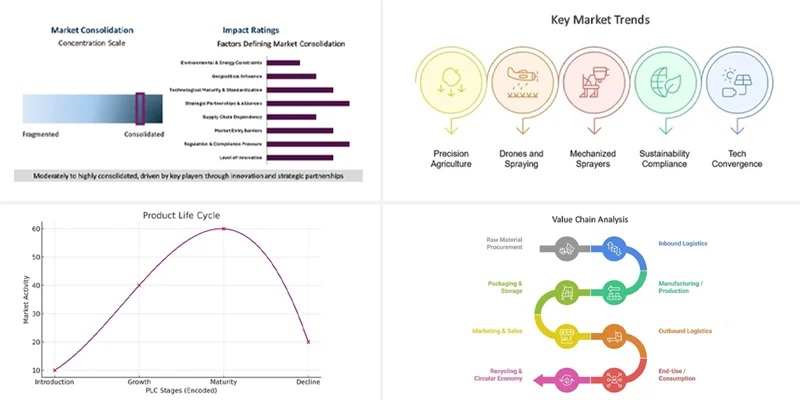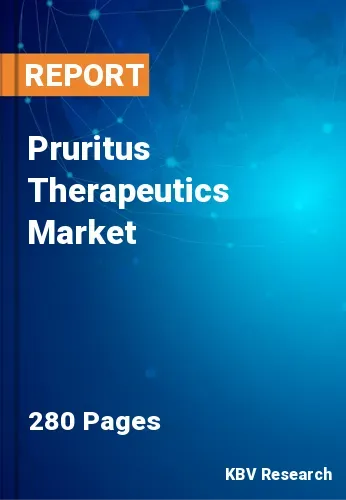The Global Pruritus Therapeutics Market size is expected to reach $11.2 billion by 2030, rising at a market growth of 4.3% CAGR during the forecast period.
The primary form of pruritus treatment in recent years has been oral antihistamines. Patients with pruritus that worsens at night may benefit from sedating (first-generation) antihistamines due to their soporific effects. Consequently, the Antihistamines segment would capture approximately 1/5th share of the market by 2030. In cases of urticaria, non-sedating (second-generation) antihistamines like loratadine, desloratadine, cetirizine, and levocetirizine may relieve pruritus during the day. Sedative antihistamines, such as hydroxyzine, may be particularly beneficial with pruritus during the night. Some of the factors impacting the market are rising incidence of skin diseases, increasing Aging population, and inadequate drug usage information leads to poor patient adherence.

According to the World Health Organization, skin illnesses are among the most prevalent of all human health conditions, affecting almost 900 million people worldwide at any given moment. Over 80% of all skin illnesses are caused by five common issues. The body's neurological system and the external environment may be connected to the underlying causes of pruritus. The environmental triggers that may produce pruritus have risen due to changing climatic conditions. Additionally, the number of people who suffer from pruritus is increasing due to the expanding use of chemicals in personal care and cosmetics. The rising prevalence of pruritus will drive this market. People are living longer worldwide. Today, most people may anticipate living into their sixties and beyond. The number of older people and their population proportion is increasing in every nation. According to WHO, one in six individuals will be 60 and above by 2030. One of the most prevalent conditions in older people or persons over 65 is senile pruritus, which is identified by an emerging itch and may be accompanied by changes in temperature and textural characteristics. This market will experience consistent expansion due to the rising prevalence of elderly people worldwide, and the risk of pruritus increases with aging.
However, nearly half of treatment failures in the generic-dominated pruritus drug industry are attributable to insufficient patient adherence. Most of the time, people are unaware that utilizing topical steroids more than twice a day raises the risk of adverse effects, raising the cost of treatment and decreasing the effectiveness of the medications. Because patients are less cooperative with their prescribed medications due to this inadequate information regarding their condition and drug use, the market's expansion is hampered.
By distribution channel, the market is divided into drug stores & retail pharmacies, hospital pharmacies, and online providers. The drug stores and retail pharmacies segment procured the highest revenue share in the market in 2022. Buying pruritus therapeutics from drug stores and retail pharmacies offers several benefits to patients and consumers. These establishments are accessible, convenient, and provide a range of over-the-counter (OTC) and prescription medications for the treatment of itching or pruritus. Retail pharmacies typically have extended hours, including evenings and weekends, making it convenient for individuals to purchase pruritus treatments at times that suit their schedules.

On the basis of disease type, the market is segmented into atopic dermatitis, allergic contact dermatitis, urticaria, and others. In 2022, the atopic dermatitis segment dominated the market with the maximum revenue share. Eczema, or atopic dermatitis, is one of the most prevalent chronic skin diseases, typically beginning in childhood. Asthma, food allergies, and allergic rhinitis may all be related to skin illnesses. Specific foods, including citrus fruits, eggs, tomatoes, and milk, can also bring on children's eczema. Atopic dermatitis causes the primary skin to expand, redden, develop vessels, crack, crust, break down, and scale due to the immediate skin's severe itching and inflammation. As a result, this market is mainly driven by the increasing prevalence of atopic dermatitis.
Based on product, the market is fragmented into corticosteroids, antihistamines, local anesthetics, counterirritants, immunosuppressant, calcineurin inhibitors, and others. The immunosuppressant segment recorded a remarkable revenue share in the market in 2022. The anti-inflammatory properties of the oral immunosuppressants cyclosporine and azathioprine are most likely responsible for the antipruritic effects observed in atopic dermatitis sufferers. A double-blind, randomized, placebo-controlled research has demonstrated oral cyclosporin medication to reduce itch and disease severity in atopic dermatitis.
| Report Attribute | Details |
|---|---|
| Market size value in 2022 | USD 7.7 Billion |
| Market size forecast in 2030 | USD 11.2 Billion |
| Base Year | 2022 |
| Historical Period | 2019 to 2021 |
| Forecast Period | 2023 to 2030 |
| Revenue Growth Rate | CAGR of 4.3% from 2023 to 2030 |
| Number of Pages | 280 |
| Number of Table | 400 |
| Report coverage | Market Trends, Revenue Estimation and Forecast, Segmentation Analysis, Regional and Country Breakdown, Companies Strategic Developments, Company Profiling |
| Segments covered | Disease Type, Product, Distribution Channel, Region |
| Country scope | US, Canada, Mexico, Germany, UK, France, Russia, Spain, Italy, China, Japan, India, South Korea, Singapore, Malaysia, Brazil, Argentina, UAE, Saudi Arabia, South Africa, Nigeria |
| Growth Drivers |
|
| Restraints |
|
Free Valuable Insights: Global Pruritus Therapeutics Market size to reach USD 11.2 Billion by 2030
Region-wise, the market is analysed across North America, Europe, Asia Pacific, and LAMEA. In 2022, the North America region witnessed the largest revenue share in the market. The development region's substantial market layers have facilitated the growth of effective and promising medications and pruritus treatments. The North American market will be driven by the rising private capital investment in research & development of new therapies to meet the expanding demand for pruritus treatments. The market will benefit from supporting government policies and expanding the pharmaceutical and healthcare industries. The well-established healthcare system makes treatments accessible and inexpensive for people of all ages, which supports market growth.
The market research report covers the analysis of key stake holders of the market. Key companies profiled in the report include Bristol Myers Squibb Company, Novartis AG, Pfizer, Inc., Sanofi S.A., Astellas Pharma, Inc., Cara Therapeutics, Inc., GlaxoSmithKline PLC (GSK), Teva Pharmaceuticals Industries Ltd., Amgen, Inc., and AbbVie, Inc.
By Disease Type
By Product
By Distribution Channel
By Geography


This Market size is expected to reach $11.2 billion by 2030.
Rising incidence of skin diseases are driving the Market in coming years, however, Inadequate drug usage information leads to poor patient adherence restraints the growth of the Market.
Bristol Myers Squibb Company, Novartis AG, Pfizer, Inc., Sanofi S.A., Astellas Pharma, Inc., Cara Therapeutics, Inc., GlaxoSmithKline PLC (GSK), Teva Pharmaceuticals Industries Ltd., Amgen, Inc., and AbbVie, Inc.
The expected CAGR of this Market is 4.3% from 2023 to 2030.
The Corticosteroids segment is leading the Market by Product in 2022; thereby, achieving a market value of $2.4 billion by 2030.
The North America region dominated the Market by Region in 2022, and would continue to be a dominant market till 2030; thereby, achieving a market value of $4.2 billion by 2030.
Our team of dedicated experts can provide you with attractive expansion opportunities for your business.

